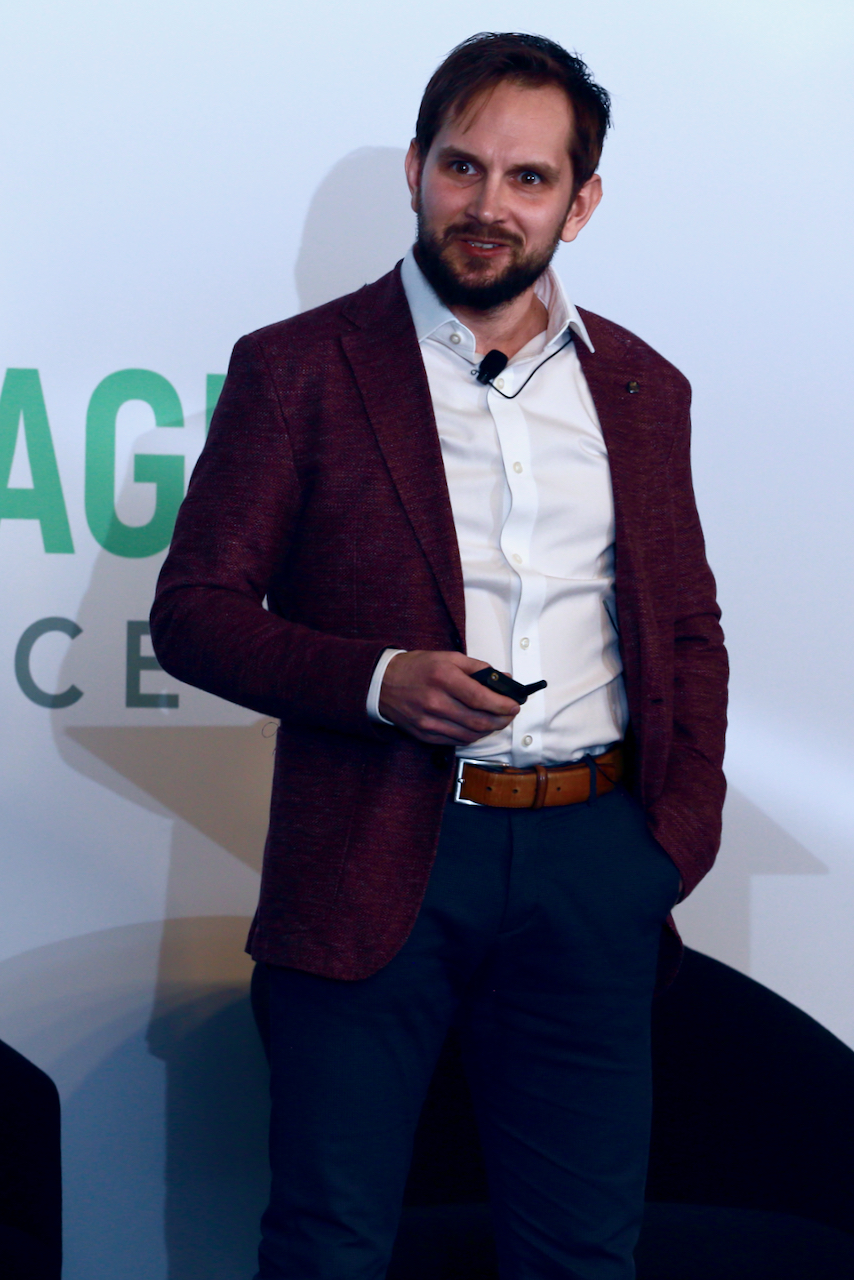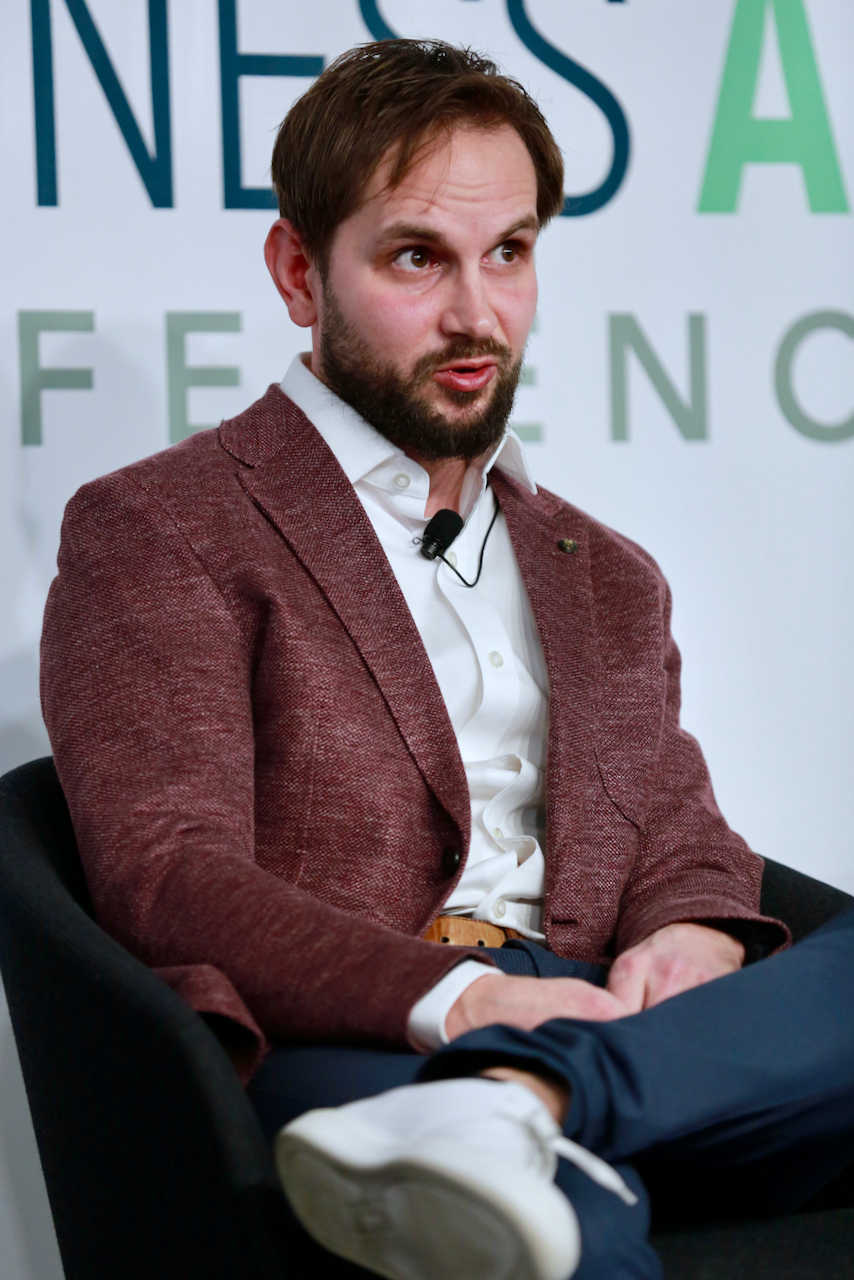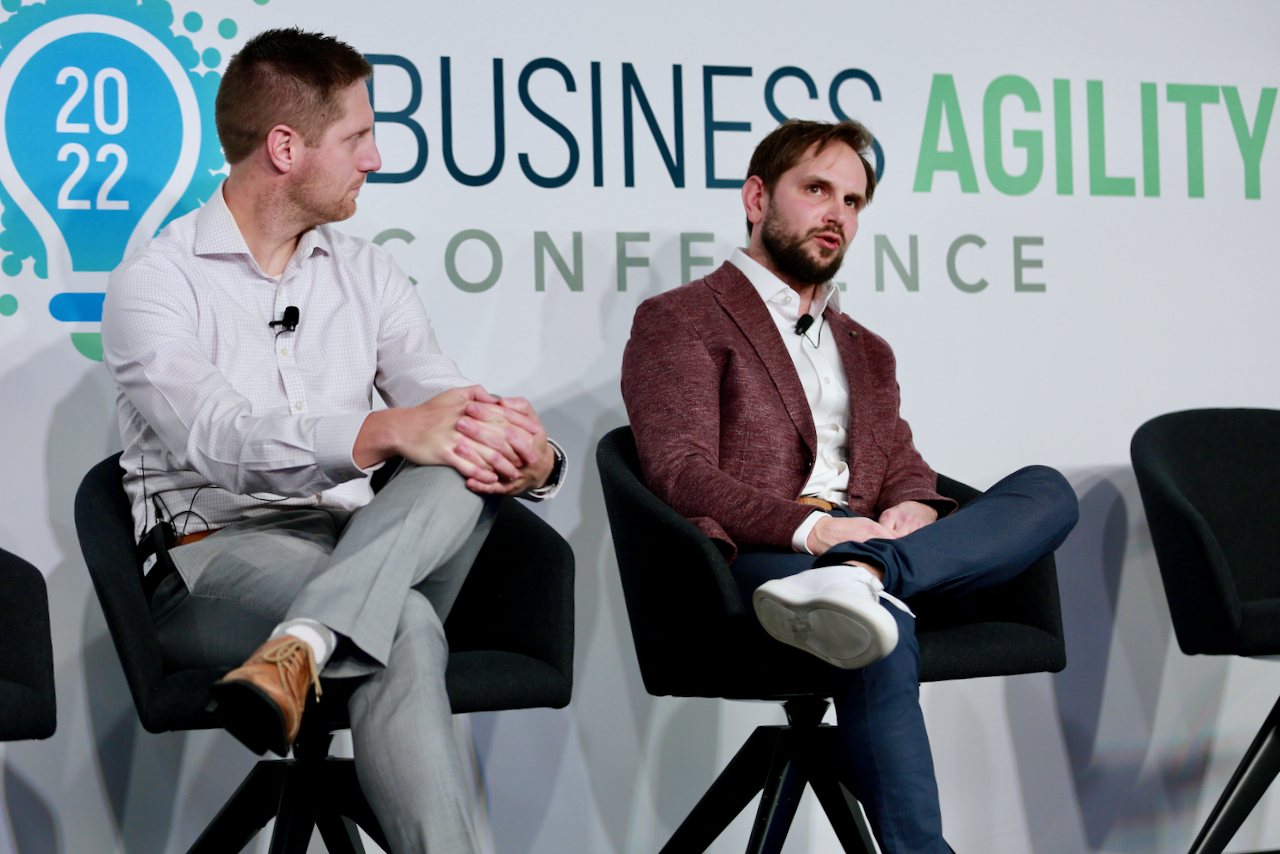When I asked the very same question on the legal conference in Dubai, to lawyers, and I can tell you that the response was quite the opposite. You can move the Slido one slide, if I may ask. Many people knew about law, right? Lawyers, practitioners, attorneys. But just a few of them knew about Agility. Ladies and gentlemen, my name is Ondrej. I come from Prague, the heart of Europe. I'm a Co-founder of a company called AgiLawyer. I'm not a lawyer. But I will be sharing a story with you of how we are overcoming barriers to bring Agility to lawyers. The second question I asked on the legal conference is, "What do you think that Agility is?" And the response is, sorry? "It's a race with dogs." Maybe you know this race. This is the race when you direct your dog through a preset obstacle course in a limited time frame. And I think it's wrong. I think it's a wrong perspective. Because even though it feels like we are jumping from one thing to another, we are facing different obstacles in our life, it's still a wrong perspective. And I hope that you will agree, by the end of this talk, that there is a better analogy between Agility and dogs. And I'm not a lawyer as I told you.
So how it come that I'm speaking here and how it come I'm speaking on the legal conferences, because I came from IT? The reason is my wife because she's a lawyer. She has her own little practice. So I can tell you that over the past decade, I learned about lawyers, maybe more than I should. And I learned two things. That they are constantly on the phone, they are constantly on the email. They are jumping from one thing to another and they want to have everything on their radar. It's like, "Are we on the right things?" "Are we on time?" "Do we have enough right cases?" "Do we have enough right people for the cases?" It never ends. And I also learned a second thing, that the lawyers seek salvation in technology. Because there is this big legal tech AI solution. "Can we use it for our own practice?" You can. But when you do this, it will probably be outdated. Because the technology is moving too fast, what I learned when I did my PhD on the pace of technology innovation. So to be frank, I was thinking a lot about that. I was thinking why we IT people, because I was responsible for building IT teams, why we IT people are so relaxed sometimes? Because we don't really use emails. If you send us an email, we often have an autoreply, "Please create a task." Because we learn that tasks are great. Because you can measure them, you can estimate them, you can plan them, you can assign them to somebody. And the best is if you assign them to a team. Because we learned that there is a power of a team processing the tasks. And we also learned that teams should meet pretty often, like daily, just to know what are the tasks that should be done next. And we learned other things?
Like we heard yesterday that the team should meet pretty frequent to have a retrospective, right? Just to realize what are the tasks that could be automated. Which are the tasks that are eating our time and we could simply just get rid of them. And in IT, we can actually automate. When it comes to lawyers, it's a little bit more difficult. Anyways. We sit together, my wife, family evening, bottle of wine. I was like, "Let's implement Agility in your law firm." So we started a project. We started a project. We call it Dove 4.0. Why Dove 4.0? My wife's firm is called Holubová. Exact translation would be something like the pigeons, like that bird, right? But since the majority of her colleagues are ladies, we called it the Dove, like the female version of it. 4.0, because Agility, and Agility has often been seen like an important asset to live the fourth industrial revolution. So Dove 4.0. So we started this project. I was really enthusiastic about speaking to the lawyers, to the attorneys, how cool the Agility is, and that they should have tasks and they should have the ceremonies. And I even invented my own term, like a legal story. Like the analogy to the user story or technical story that we know well. And then I failed.
Because they had no clue what I'm talking about. It was like, "Ondrej, What are you talking about? We have legal cases. Ceremonies? What type of ceremonies? Are you serious? Legal stories?" I was like, "Actually, I was serious." And then it took me a while. I was working hard with them. I explained them that the legal case is actually a unit of work that you can slice into independent tasks or pieces called tasks. And it went great. And then I popped up on an incredible conference, on the Business Agility Conference in 2020. More coincidentally, I would say. And I was sitting there where you are sitting now. I was listening to those incredible stories of the people who use Agility to survive hotels or transform the state. I was like, "Wow, that's powerful. That's far beyond what I thought that Agility actually is." Because I literally thought that Agility is something that we use in IT, and more or less just experimenting with that in the law firm. So I sit together with Evan, the CEO of the community. I was like, "Hey, Evan, we do quite the same thing with lawyers. Would you like to help me?" "Sure."
There is the Business Agility Library. Just share the story with us." So I did. And it was a great response, to be frank, and not just from the BAI community. It got a great response from the legal community. What, in this case, was probably even more important. So it was a great booster. So how we moved forward. We wanted to be professional, right? So we founded the company. We called it the AgiLawyer, Agility for Lawyers. And we started to consult more clients. It was great.
We even consulted the big four legal departments, which was funny. And how we did it. Lawyers, they don't know what Agility is. We started to play this Ball Point game. Maybe you heard about... This is a great game if you're going to explain to the non-IT people what the Agility is and what this means to be in the cadence, in a flow. Second thing we did, we started to speak on the legal events because were invited to a few of them. We did workshops. We started to get involved to the legal communities to explain them that Agile, it is not really a dog race. And to be frank, we realized that this fact of being involved with many, say, legal communities was sort of important for us just recently because you may know that there is the refugee crisis in Europe. And we are pretty desperate about this because we are like, "Hey, what can we do? We have lawyers, communities. We are agilist, so isn't there a way that we could contribute to help to what's happened there? He says, "Let's start a project. We can do it overnight. Put up the website, two buttons, like, 'I need help', 'I need a legal advice', like a refugee. And 'I want to help. I'm a lawyer. I would like to do this for free of charge.'" So we literally did this overnight. And to be frank, we got 120 volunteers overnight from 20 countries. So I don't have so much time to share the whole story. But I could tell you that this is probably the fastest Agile project we ever did. Because you have a fast-growing "law firm" full of volunteers who are eager to help us. It's great.
Anyways, what next we did. We realized that we need to understand the law firms from different angles, not just Agility. So we started our own research. If you would like to just know and see how we are researching and asking the questions like: how do you do sales, marketing, digitalization, etc. Just feel free to download it. We prepared a snippet for you with some bonus section. What we learned about lawyers so far. The first thing we learned is that it's all about people and it's often about Scrum Masters. Because sometimes in the IT, it's really hard to justify the role of the Scrum Master. You may know it. So how you should do this in the law firm, right? Because when we started, we literally went to the law firm with 500 people talking to the managing partner. "Hey, you need to be agile and you need Scrum Masters." It was like, "What?" "Are you serious?" Right? So it's all about Scrum Masters, to be frank. We are really lucky because we got a great lady who we trained to be a Scrum Master. Who was originally an office manager of the law firm. And we even sent her to the Scrum certification training. It was really to a surprise of all the IT people there because they never seen a lady from the law firm on the Scrum certification training. This was really great. And I was honored seeing her representing basically their Dove project on the World Agility Forum in Lisbon last year, because they were promoted or nominated to be one of the best transformation in particular year.
What next we learned. We never sell Agility, right? We said, "Okay, we need to find the need. We need to find a way how we can use Agility as a tool to solve certain challenges that the law firms have. So you can see this tin can phone. What represents what is the biggest need in the law firm. It's communication. That's a big mess in the law firms because they literally use any means of communication that is available in the markets. Like WhatsApp, Zoom, some more Kanban-style things. It's a big, big mess. It's like, "Okay, let's try to see if we could justify that Agility could help with this thing." So we need to understand how much this costs. How much this costs. Grammarly just recently estimated that the poor communication of the businesses in US costs $1.2 trillion. It's a lot of money. What's next? Emails. Now, lawyers are using emails. They are not just using them. They are overusing them. And what this means... Price Waterhouse Coopers, I think 2020, one-third of our time we spend on email. Maybe more alerting thing is that 64% from the time we spent working with email is unproductive. Because we are reading emails. We are reading emails twice, three times. Still don't want to answer, right? We are deleting emails. Takes 3 seconds to delete an email according to their studies. So yeah, well, emails. But there are more problems with the emails. Like lawyers, often they send an email to multiple people in the same time. Guess what happens? Nobody responds because the responsibility is not clearly defined. So they said that we have to focus on the email. There is an example. Let's imagine that I'm a client and Bob, the great lawyer has a great assistant, Lisa, who is responsible for registering the firm. So how it typically looks, you have this type of email or any other format of a message that is being sent from the partner to the system that's always containing the same information. And what does it contain? Sorry, I cannot see it here. So it always contains like who should do this, who should do the thing. In this case, probably it's to Lisa. What next it contains? What this concerns to? Well, this is about registering the firm. Client, the troublemaker, Ondrej wants to get the firm registered and what does he need? It was already in the subject. The firm should get registered. And there is also a hint on how the firm should get registered, even though there could be number of ways how we can get the firm registered. What is often missing here on this slide is the definition of done. Because there is not a clear definition of what this means that the firm got registered.
So this is what we realized. And sometimes there is a deadline as soon as possible and Bob to verify. And we started to speak to lawyers like, "Hey, when you are working with emails, it's great, but maybe think about moving these things to the tasks." And this is where we shifted because there is always a structured information in the email. There is an assignee, there is a description, like a checklist or something. So think about emails in this sense and then when you do that and you end up with a backlog of the work to get done. So these are the things that you need to deliver. So what's next? I would say this leads me to the next point what we learned about lawyers. That you have the backlog that needs to be processed by somebody. And the thing is that it needs to be processed by a team. And this basically is the analogy to what I said at the very beginning. Many people do not realize... Nobody will tell you, "We are not working as a team." Everyone is working as a team, right? But they don't realize that they are often managing the team as a group of individuals. They are not really seeing them as a team where one complements to another. So what we learn about lawyers; that you truly need to teach them to train the team to do the teamwork. Because the managing partner, or managing lawyer, he should be seen like this visionary more or less. Just saying, "Hey, this is the way we want to get," and he has the whole team that he truly relies on. Because if one of them fails, like the dog in front, then probably every one of them fails. So when talking about Agility, then I would like to see lawyers to basically understand it like a sled more like than the dog race. Let's go to the wrap-up.
What we learned about lawyers and how to overcome barriers to bring Agility maybe not just to lawyers. Do a pilot. It's a great thing because you literally understand the type of business you are dealing with. Find a community to help you to boost it. In our case, it was the Business Agility community that helped us to boost to legal communities. Understand the customers a little bit more in detail. So do research across all the firms like what you could imagine. It will give you the perspective that you haven't thought about. And just keep in mind that role of a Scrum Master is a great thing but sometimes it's really hard to justify it in the non-IT sector. Never sell Agility; you will never succeed, or at least we haven't succeeded. Maybe you will be more successful than we were. Just focus on the needs and teach the team to do the teamwork. Thank you very much. Connect me on the LinkedIn and thanks.






